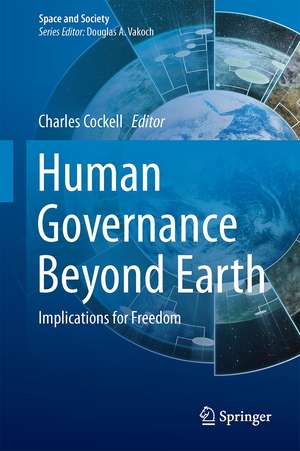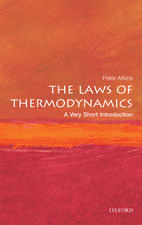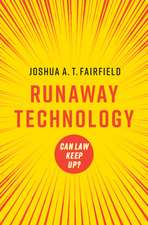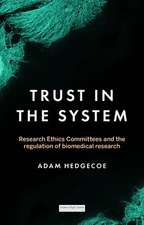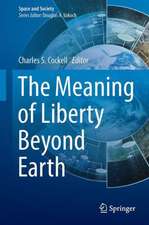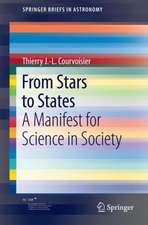Human Governance Beyond Earth: Implications for Freedom: Space and Society
Editat de Charles S. Cockellen Limba Engleză Hardback – 9 iun 2015
In this volume the authors explore how people are likely to be governed in space and how that will affect what sort of liberty they experience. Who will control oxygen? How will people maximise freedom of movement in a lethal environment? What sort of political and economic systems can be created in places that will be inherently isolated? These are just a few of the major questions that bear on the topic of extra-terrestrial liberty. During the last forty years an increasing number of nations have developed the capability of launching people into space. The USA, Europe, Russia, China and soon India have human space exploration programs. These developments raise the fundamental question of how are humans to be governed in space.
This book follows from a previous volume published in this series which looked at the Meaning of Liberty Beyond the Earth and explored what sort of freedoms could exist in space in a very general way. This new volume focuses on systems of governance and how they will influence which of these sorts of freedoms will become dominant in extra-terrestrial society. The book targets a wide readership covers many groups including:
- Space policy makers interested in understanding how societies will develop in space and what the policy implications might be for space organisations.
- Space engineers interested in understanding how social developments in space might influence the way in which infrastructure and space settlements should be designed.
- Space scientists interested in how scientific developments might influence the social structures of settlements beyond the Earth.
- Social scientists (political philosophers, ethicists etc) interested in understanding how societies will develop in the future.
| Toate formatele și edițiile | Preț | Express |
|---|---|---|
| Paperback (1) | 778.94 lei 6-8 săpt. | |
| Springer International Publishing – 9 oct 2016 | 778.94 lei 6-8 săpt. | |
| Hardback (1) | 784.92 lei 6-8 săpt. | |
| Springer International Publishing – 9 iun 2015 | 784.92 lei 6-8 săpt. |
Din seria Space and Society
- 20%
 Preț: 692.49 lei
Preț: 692.49 lei - 20%
 Preț: 763.92 lei
Preț: 763.92 lei - 15%
 Preț: 642.68 lei
Preț: 642.68 lei - 15%
 Preț: 643.84 lei
Preț: 643.84 lei -
 Preț: 389.11 lei
Preț: 389.11 lei - 18%
 Preț: 949.90 lei
Preț: 949.90 lei -
 Preț: 385.25 lei
Preț: 385.25 lei - 18%
 Preț: 1115.94 lei
Preț: 1115.94 lei - 18%
 Preț: 893.84 lei
Preț: 893.84 lei - 18%
 Preț: 731.91 lei
Preț: 731.91 lei - 18%
 Preț: 1846.28 lei
Preț: 1846.28 lei - 24%
 Preț: 725.96 lei
Preț: 725.96 lei - 18%
 Preț: 949.73 lei
Preț: 949.73 lei - 18%
 Preț: 897.33 lei
Preț: 897.33 lei - 18%
 Preț: 954.62 lei
Preț: 954.62 lei - 15%
 Preț: 700.75 lei
Preț: 700.75 lei - 24%
 Preț: 719.82 lei
Preț: 719.82 lei - 18%
 Preț: 781.77 lei
Preț: 781.77 lei - 18%
 Preț: 997.88 lei
Preț: 997.88 lei - 18%
 Preț: 725.75 lei
Preț: 725.75 lei - 24%
 Preț: 737.60 lei
Preț: 737.60 lei - 23%
 Preț: 842.19 lei
Preț: 842.19 lei
Preț: 784.92 lei
Preț vechi: 957.22 lei
-18% Nou
Puncte Express: 1177
Preț estimativ în valută:
150.19€ • 157.24$ • 124.28£
150.19€ • 157.24$ • 124.28£
Carte tipărită la comandă
Livrare economică 05-19 aprilie
Preluare comenzi: 021 569.72.76
Specificații
ISBN-13: 9783319180625
ISBN-10: 3319180622
Pagini: 237
Ilustrații: X, 237 p. 2 illus.
Dimensiuni: 155 x 235 x 22 mm
Greutate: 0.53 kg
Ediția:2015
Editura: Springer International Publishing
Colecția Springer
Seria Space and Society
Locul publicării:Cham, Switzerland
ISBN-10: 3319180622
Pagini: 237
Ilustrații: X, 237 p. 2 illus.
Dimensiuni: 155 x 235 x 22 mm
Greutate: 0.53 kg
Ediția:2015
Editura: Springer International Publishing
Colecția Springer
Seria Space and Society
Locul publicării:Cham, Switzerland
Public țintă
ResearchCuprins
From the Contents: Human Governance and Liberty Beyond Earth.- Rawlsian Deliberation about Space Settlement.- Extraterrestrial Liberty: Can it be Planned?.
Recenzii
“This collection of fifteen articles is based on adiscussion at the British Interplanetary Society on June 12 and 13, 2014. … Theaudience for this book … include some social scientists, as well as spacepolicy makers and engineers. Summing Up: Recommended. Graduate students,researchers/faculty, and professionals/practitioners.” (T. Barker, Choice, Vol.53 (3), November, 2015)
Notă biografică
Charles Cockell is Professor of Astrobiology at the University of Edinburgh. His research interests are focused on microbial life in extreme environments. Prof. Cockell is co-author / editor of 8 books and a large number of research articles.
Textul de pe ultima copertă
This book extends the discussion of the nature of freedom and what it means for a human to be free. This question has occupied the minds of thinkers since the Enlightenment. However, without exception, every one of these discussions has focused on the character of liberty on Earth.
In this volume the authors explore how people are likely to be governed in space and how that will affect what sort of liberty they experience. Who will control oxygen? How will people maximise freedom of movement in a lethal environment? What sort of political and economic systems can be created in places that will be inherently isolated? These are just a few of the major questions that bear on the topic of extra-terrestrial liberty.
During the last forty years an increasing number of nations have developed the capability of launching people into space. The USA, Europe, Russia, China and soon India have human space exploration programs. These developments raise the fundamental question of how are humans to be governed in space.
This book follows from a previous volume published in this series which looked at the Meaning of Liberty Beyond the Earth and explored what sort of freedoms could exist in space in a very general way. This new volume focuses on systems of governance and how they will influence which of these sorts of freedoms will become dominant in extra-terrestrial society. The book targets a wide readership covers many groups including:
In this volume the authors explore how people are likely to be governed in space and how that will affect what sort of liberty they experience. Who will control oxygen? How will people maximise freedom of movement in a lethal environment? What sort of political and economic systems can be created in places that will be inherently isolated? These are just a few of the major questions that bear on the topic of extra-terrestrial liberty.
During the last forty years an increasing number of nations have developed the capability of launching people into space. The USA, Europe, Russia, China and soon India have human space exploration programs. These developments raise the fundamental question of how are humans to be governed in space.
This book follows from a previous volume published in this series which looked at the Meaning of Liberty Beyond the Earth and explored what sort of freedoms could exist in space in a very general way. This new volume focuses on systems of governance and how they will influence which of these sorts of freedoms will become dominant in extra-terrestrial society. The book targets a wide readership covers many groups including:
- Space policy makers interested in understanding how societies will develop in space and what the policy implications might be for space organisations.
- Space engineers interested in understanding how social developments in space might influence the way in which infrastructure and space settlements should be designed.
- Space scientists interested in how scientific developments might influence the social structures of settlements beyond the Earth.
- Social scientists (political philosophers, ethicists etc) interested in understanding how societies will develop in the future.
Caracteristici
Explores how people are likely to be governed in space and how that will affect what sort of liberty they experience Provides a strong focus on future systems of governance beyond Earth, economic and political, rather than the general philosophical aspects of what liberty might mean Serves an interdisciplinary readership consisting of space policy makers, space engineers and scientists, social scientists Includes supplementary material: sn.pub/extras
